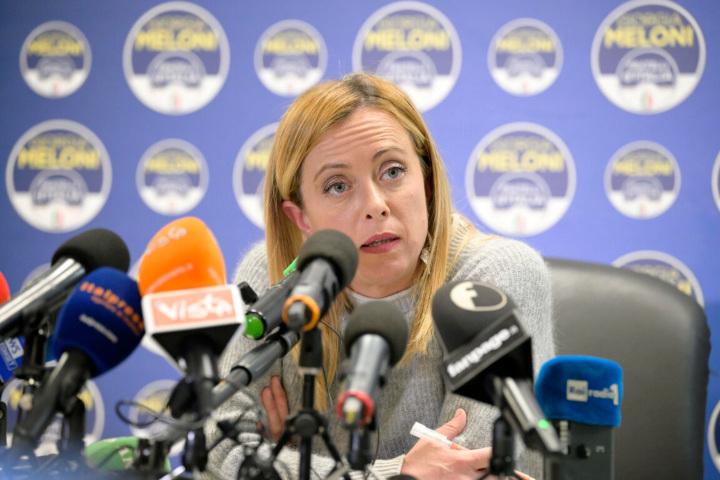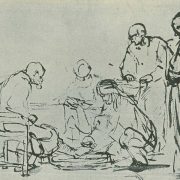
Photo: ANSA/Claudio Peri
The Italian political system was born at the end of World War II with checks and balances to prevent an old force (the fascists) and a new force (the communists) from taking power.
In addition to the formal measures there were informal restraints that cemented the situation: a cultural/political veto on getting into a coalition with fascists or communists and bringing them into government.
Thus, parties on the extreme right and left were excluded from government with an informal agreement, and the country was ruled from a massive magmatic center, revolving around the DC, the Christian Democrats.
External constraints and internal fragilities
With the strongest communist party in the West, the PCI, by the late 1960s Italy became an informal Cold War battleground. Red and black terrorism threatened the country’s stability. It culminated in the 1978 kidnapping and assassination of the country’s most powerful politician, DC leader Aldo Moro. Then Italy’s debt to GDP ratio was about 60%.
After Moro’s kidnapping in the 1980s, the government implemented a series of measures that were supposed to reduce social discontent: it distributed money widely, doubling the state budget deficit which soared to over 100% of GDP.
The distribution of social benefits actually helped drain the country of extreme social protest. A similar policy had been used in the early 1960s, again to limit social dissent. Then the deficit was drained in the 1970s in a short time through double-digit inflation and draconian measures of budget control.
Perhaps the Italian government thought it would be using inflation and great budgetary discipline to bring the accounts back in order a decade later. Actually, in the late 1980s, the end of the Cold War eliminated all the political and economic boundaries that had held Italy up to that time.
Plus, the 1994 crisis, a massive anti-corruption drive, wiped out the old setup. The pillars of the Italian political system — the DC, the PSI, and the alliance of smaller parties — collapsed and conversely the communists of the PCI were cleared.
Then, new political forces emerged with different agendas, picking up parts of past legacies but with new impulses, such as Silvio Berlusconi’s Forza Italia and Umberto Bossi’s Northern League. Moreover, Italy agreed to enter the single European currency, the euro, with all its rules, including bringing down debt/GDP ratio to 60%.
Finally, there was an electoral reform, which was supposed to make the country more governable. However, all this happened without changing the constitution, which was instead designed to balance different political challenges, which at that point no longer existed.
This created a mix of external constraints with the European Union and internal fragilities, including the lack of parties with real government experience, a mix of institutional curbs, and old issues with new parties. In this magma in fact no party had the political clout to radically address the budget deficit and the backwardness of the Italian welfare and bureaucratic state.
The combination of a debt-to-GDP ratio that reached 150% and so many limits on the country’s market freedom are a huge brake on national development. There are rents of position, some harking back to fascist times, each understandable and justifiable. But then, when put together, crippled the country.
The monopolies of small businessmen on beaches and taxi drivers, but also pharmacists, journalists, and so on each has its own reason, but all together they paralyze the country. In this situation of extreme confusion and structural weakness, with growing abstention from voting, the M5s came to power in 2018.
Here comes the Draghion
They did not actually become a real governing force, but with their appearance, they increased the enormous national confusion. At this juncture, in the midst of COVID, came the government of Mario Draghi.
It was possible precisely because Italy has a system of checks and balances, and democracy here is indirect: the premier is not chosen directly by the people but voted in by parliament. Fair or not, constitutional reform is needed to change the system.
Meanwhile, in these 30 years, the former PCI has changed its name into PD (Democratic Party), absorbed part of the former DC, and like the DC has become de facto part of the state administration, which guarantees the governability of the country.
That governability is minimal, and for some it is a problem because it does not address the underlying problems accumulated over these three decades.
Meanwhile, in recent years, the Cold War and Moscow’s influence in Italy has also returned. In this context, to say that Moscow brought down the Draghi government is to attribute a great political success to Russia. On the other hand, to deny Russian pervasive influence in Italian politics is to deny reality. A new informal political veto on Moscow is beginning to shape up.
Today Giorgia Meloni, according to the polls the leader of the largest party after the elections FdI (Brothers of Italy), is moving between two vetoes, one old but never quite eliminated (that of being a fascist) and a new one not hers but of her allies (that of being pro-Russian). It is a very difficult path.
With the war in Ukraine, Italy clearly teetering, Russia boasting rightly or wrongly of having brought down the British premier and kneecapped the French president by getting a parliamentary majority elected against him, and Germany muddled up, the US plans to send Speaker of the House of Representatives Nancy Pelosi to Taiwan (the island de facto independent but claimed by Beijing as part of one China), irking China.
From Beijing this is all very baffling. China has an extremely practical soul.
If Russia loses militarily in Ukraine and politically in Europe, Beijing will become frightened and perhaps may begin to change. If conversely Russia wins on these two fronts, then China will follow Russia. The concordance between the Ukraine game and China game must also be clear to Washington, since the National Security Adviser Jake Sullivan recently explained that defeating Russia would reassure Taiwan.[1]
Of course, US policy is not an omniscient Leviathan: it is made up of a thousand trends and counter-trends that must continually find mediation. But objectively in these international conditions and without a clear objective to pursue, Pelosi’s trip to Taiwan risks creating confusion not only in Asia but also in Europe and Ukraine.
Perhaps, it would be better to rather focus on the war and political stabilization in some European countries, to give an important message to China but also to Europe and Ukraine. After all, during the first Cold War, the Korean War, and the long war in Indochina, first by the French and then by the Americans, had a direct and important fallout in European affairs as well.
Today European politics and wars can be central to Asian affairs. Conversely, moving uncoordinatedly between East and West gives a message to Beijing of either chaos or unfathomable conspiracies on the American side.
Both political meta-messages can be dangerous. Perhaps, the question then would be, what can Pelosi do in Italy to help Taiwan? In some ways, the China issue can also be seen through Italy. Meloni, today possible candidate for prime minister, has the burden of answering that question. Or, if they beat the present forecasts, the PD will have to deal with it.
[1] «A Russian Defeat in Ukraine Could Save Taiwan», in The Atlantic, July 25, 2022.





